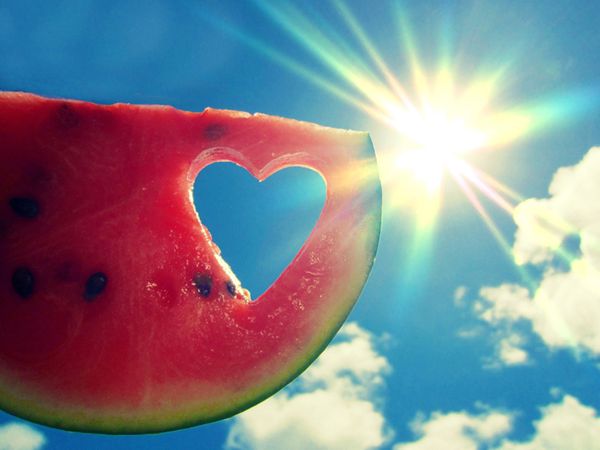The question is, why is there so much craze for the watermelon? At first glance, it may seem like nothing more than a big ball of water. We all know that there is nothing more refreshing than a big, chilled wedge of watermelon on a hot, summer day and it does sport a stylish scientific name of Citrullus Lanatus, but what’s the real reason so many people flock to grocery stores every summer to buy a big, awkward fruit like this one? Well, it is hard to narrow it down to a single reason; there are actually a lot of them.
The long list of healthy or beneficial effects of watermelons are mainly derived from its unique nutrients,vitamins, minerals, and organic compounds. These include significant amounts of :
Prevents Heat Stroke: Watermelon is effective in reducing both your body temperature and blood pressure. Many people in tropical regions eat this fruit every day in the afternoon during the summer to protect themselves from heat stroke. In India, you will find the fruit being sold by vendors in almost every street during the summer season. The high amount of water contained in watermelon also stimulates a release of excess liquid in the form of sweat, which cools your body further during hot summer days.
High Blood Pressure: The good amount of potassium and magnesium that is present in watermelons is very beneficial in terms of bringing down blood pressure. Potassium is considered a vasodilator, meaning that it releases the tension of blood vessels and arteries, thereby stimulating increased blood flow and reducing the stress on the cardiovascular system. The carotenoids present in these fruits also prevent hardening of artery walls and veins, thereby helping to reduce blood pressure and the chances of blood clots, strokes, heart attacks, and atherosclerosis.
Prevents Cancer: Watermelons have been in the public eye more and more in recent years, primarily because of their impressive level of lycopene, a carotenoid phytonutrient compound that is increasingly being linked to cancer prevention. As the years go by and the studies continue to bring in consistent results, lycopene has been shown to significantly reduce the risks of prostate, breast, colon, lung, and endometrial cancer. All in all, between the antioxidant potential of vitamin C and the impact of lycopene, watermelon is a great anti-cancer fruit!
vitamin C, calcium,magnesium, fiber, protein, and a very large amount of potassium. Furthermore, they contain vitamin A,vitamin B6, niacin, thiamin, and a wide variety of carotenoids and phytonutrients, including lycopene!
These components of watermelons contribute to its major impact on health; let’s explore some more details of those benefits below.
Prevents Heat Stroke: Watermelon is effective in reducing both your body temperature and blood pressure. Many people in tropical regions eat this fruit every day in the afternoon during the summer to protect themselves from heat stroke. In India, you will find the fruit being sold by vendors in almost every street during the summer season. The high amount of water contained in watermelon also stimulates a release of excess liquid in the form of sweat, which cools your body further during hot summer days.
High Blood Pressure: The good amount of potassium and magnesium that is present in watermelons is very beneficial in terms of bringing down blood pressure. Potassium is considered a vasodilator, meaning that it releases the tension of blood vessels and arteries, thereby stimulating increased blood flow and reducing the stress on the cardiovascular system. The carotenoids present in these fruits also prevent hardening of artery walls and veins, thereby helping to reduce blood pressure and the chances of blood clots, strokes, heart attacks, and atherosclerosis.
Prevents Cancer: Watermelons have been in the public eye more and more in recent years, primarily because of their impressive level of lycopene, a carotenoid phytonutrient compound that is increasingly being linked to cancer prevention. As the years go by and the studies continue to bring in consistent results, lycopene has been shown to significantly reduce the risks of prostate, breast, colon, lung, and endometrial cancer. All in all, between the antioxidant potential of vitamin C and the impact of lycopene, watermelon is a great anti-cancer fruit!
Diabetes: Diabetic patients, who are supposed to have a low energy and low sugar diet, often complain about starving since they don’t get to eat their staple diets, which gives them the feeling of being half fed. Watermelons can be a good supplement for them. In spite of being sweet in taste, a thick wedge will give you very few calories, since ninety nine percent of its total weight is composed of water and roughage. Moreover, the various vitamins and minerals such as potassium and magnesium help in proper functioning of insulin in the body, thus lowering the blood sugar level. Arginine, another component found in watermelons, is very effective at enhancing the impact of insulin on blood sugar. Diabetic patients can also have curries, steaks, and salads made from water melon rinds, which are even lower in sugar.
Heart Care: Lypocene, a carotenoid found in abundance in watermelon, improves cardiac functions. Beta carotene, known for its remarkable antioxidant and anti-aging properties, also keeps you young at heart and prevents age-related cardiac problems. The roughage in water melon and its very low energy, along with help from vitamin-C, carotenoids and potassium (potassium cuts the risk of a heart attack), helps to reduce cholesterol and keep your heart safe from a variety of dangerous conditions.
Macular Degeneration: Don’t worry about eye health and macular degeneration if you eat plenty of watermelon, because between the beta carotene, vitamin-C, lutein, and zeaxanthin, your eyes are well protected. They will ensure protection of your eyes from age-related blindness and degeneration, and these antioxidants will protect your eyes from other age-related ailments such as drying up of eyes and optical nerves, as well as glaucoma.
Other Benefits: Lypocene is found to be effective in repairing damaged tissues. Watermelon seeds are rich in beneficial fats and proteins. Watermelons also contain phytonutrients which have very good effects on the health and proper functioning of internal organs, eyes, and the secretion system.
____________________
References:
- Effects of watermelon supplementation on aortic blood pressure and wave reflection in individuals wi
- Effects of Watermelon Supplementation on Aortic Hemodynamic Responses to the Cold Pressor Test in Ob
- Dietary Supplementation with Watermelon Pomace Juice Enhances Arginine Availability and Ameliorates
- High Potassium Food List - Foods Rich in Potassium
Learn why potassium is important, why you may need to change your diet, what foods are rich in potassium, and how much potassium is in each food.
_________________________
Read Also:
Forces Your Body To Quickly Treat Acid Reflux In 48 Hours - Guaranteed! (watch the Video)
.












No comments:
Post a Comment